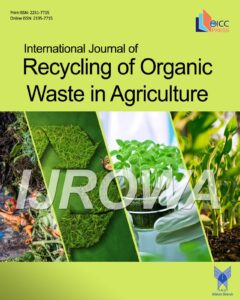Assessment of physicochemical changes during composting rice straw with chicken and donkey manure
Authors
Abstract
Purpose Traditional methods of composting are limited in timely production of good-quality compost due to recalcitrant nature of materials of plant origin. This study focused on evaluating the use chicken and donkey manure as starter cultures to biostimulate bioconversion of rice straw into bioorganic fertilizer. Use of starter cultures would enhance composting as a strategy for rice straw management to enhance soil fertilization and reduce environmental pollution.
Method In this study, chicken manure and donkey manure were used as starter cultures to enhance bioconversion of recalcitrant and abundant rice straw in Mwea, the main rice-producing area in Kenya. Treatments of the study included rice straw co-composted with chicken manure (T1), rice straw co-composted with donkey manure (T2) and a control (T0) consisting of un-treated rice straw. Temperature, pH and electrical conductivity (EC) were monitored throughout the composting period. Resultant compost types were characterized in respect to their macro-nutrient concentrations, cation exchange capacity, pH and heavy metal content.
Results Levels of temperature, pH and EC among the treatments of the study revealed significant differences at 5% level of confidence using Tukey’s test. The three resultant compost types obtained were also physicochemically different as revealed by analysis of variance of cation exchange capacity, phosphorus, nitrogen and carbon content.
Conclusion Results indicated that use of chicken and donkey manure significantly improved the composting process and the quality of resultant compost.



